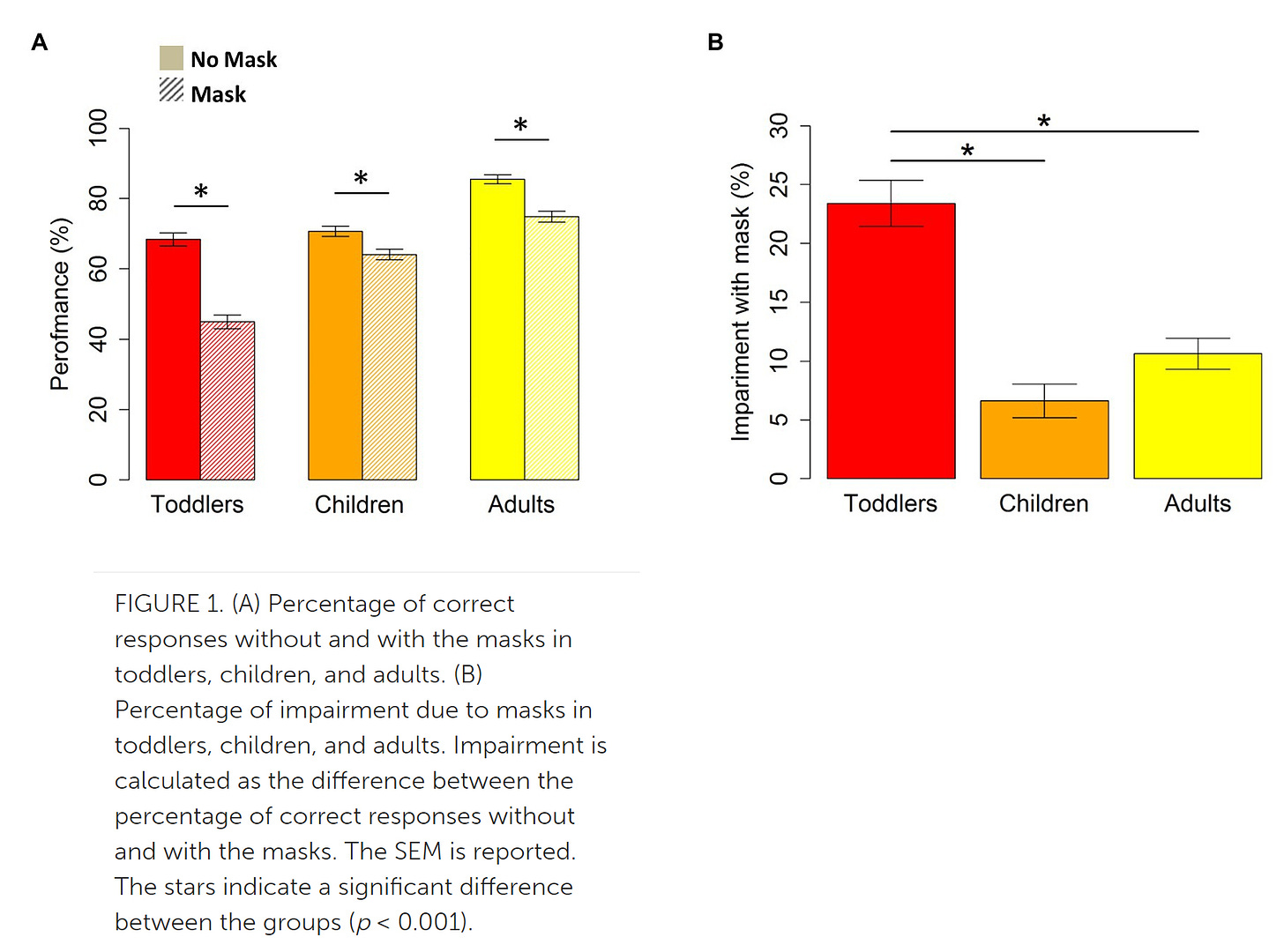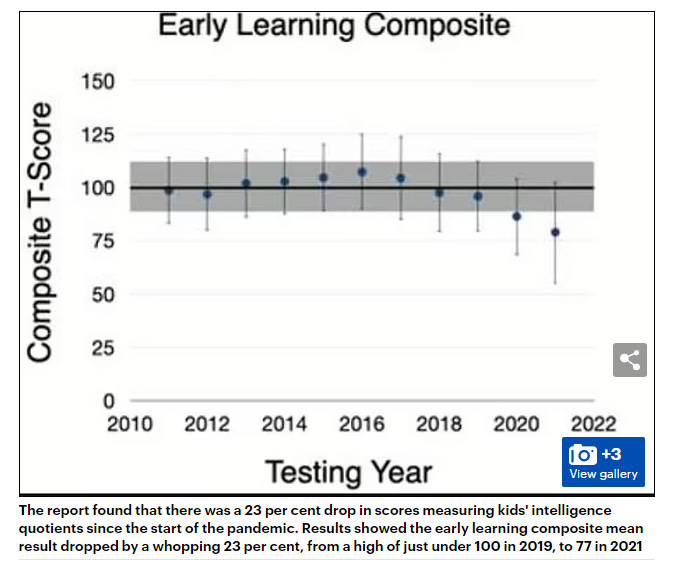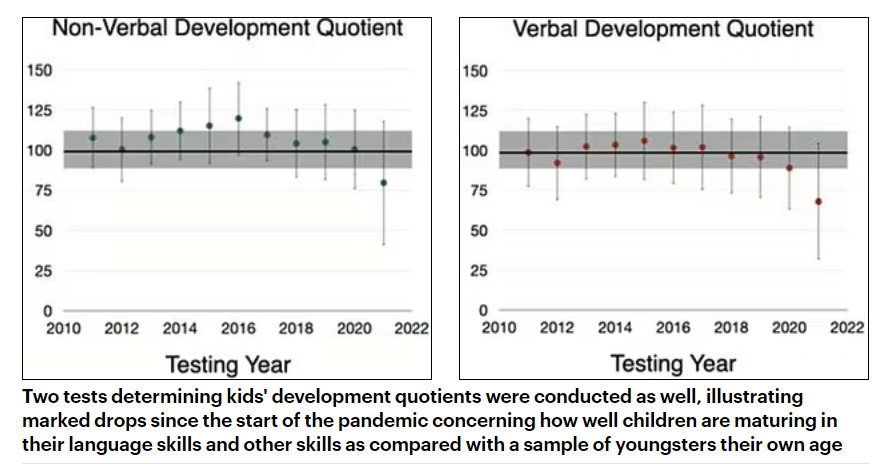Mask Harm: Children Are Being Harmed by Masks!
New CDC Report Warns Developmental Disabilities Are Up 17% in Kids 3-17. Research shows 23% drop in young children's IQ, 30% drop in verbal!

All Global Research articles can be read in 51 languages by activating the Translate Website button below the author’s name.
To receive Global Research’s Daily Newsletter (selected articles), click here.
Click the share button above to email/forward this article to your friends and colleagues. Follow us on Instagram and Twitter and subscribe to our Telegram Channel. Feel free to repost and share widely Global Research articles.
***
New CDC Report July 2023: Developmental disability up 17%, developmental delay up 19% and rising!
I will briefly review the following peer-reviewed literature on the effects of masks on children:
- 2021 Feb – Green et al – Face masks for babies
- 2021 May 25 – Gori et al – Masking Emotions
- 2021 June 30 – Walach et al – CO2 in inhaled air (censored!)
- 2022 Jan – Kisielinski et al – Toxicity of CO2 in children
- 2022 Feb – Carnevali L et al – Face processing in early development
- 2022 May 13 – Lalonde et al – Masks impact audiovisual consonant recognition
- 2022 Dec 15 – De bolt et al – Mask impact on infant learning of faces
I will also review the following articles:
- 2023 July 13 – CDC Report (July 2023) developmental disabilities up 17%
- 2022 Oct.12 – Mask mandates stunted babies’ development (Byrne et al)
- 2021 Nov.26 – 23% dive in children’s development (Deoni et al)
- baby brain grows rapidly
- brain growth is strongly affected by experiences with people in their world
- baby can recognize a mother’s face from faces of strangers
- only takes newborns a few days to learn how to discriminate between differing emotional facial expressions, such as happy, sad and surprised
- by 5 months of age a baby can match an emotional expression like a sad face with a corresponding sad vocal expression
- a 5 year old child has developed ability to recognize and label facial expressions with the competence of most adults.
- masking may hinder an infant’s ability to develop facial processing and orientating
- may interfere with the parent-infant bond and longer-term attachment.
- delays or impairments of an infant’s cognitive, social-emotional, and/or neurobehavioral development can also occur, leading to difficulties in learning and forming effective relationships later in life.
- early childhood is a critical period for development of understanding emotions and emotion processing
- face masks affect emotion understanding for all ages, but the effect is especially pronounced for toddlers
- toddlers’ performance is more impaired by a mask than older children and adults
- Around 3–5 years old toddlers focus almost exclusively on facial expressions, whereas children rely on situational cues by 8 or 9 years of age. Could explain the lower performance observed in younger children when the mask is present
- Even WHO and UNICEF discourage use of masks under age 5
- unknown if younger children exposed to face masking will have altered or delayed development of social skills later in life.

- study measured how much CO2 children 6 to 17 years old breathe over 3 minutes with surgical and FFP2 masks
- Children had CO2 exposure 3-6 times the allowable limit after only 3 minutes of breathing with a mask
- youngest children had the highest CO2 exposures!
- study was censored (retracted)
- Extensive review of animal studies
- Fresh air has 0.04% CO2
- Wearing masks (surgical or N95) more than 5 minutes: 1.4 to 3.2% CO2
- 0.3% CO2 – children – irreversible neuron damage, neuron destruction, increased anxiety, impaired learning and memory
- 0.5% CO2 – adolescents – testicular toxicity
- Faces are a predominant stimulus in an infant’s environment and constitute an important source of learning from soon after birth
- Facial expressions also have a central role in early learning; processing expressions require the use of configural information that is hindered by wearing face masks
- problem: mask wearing disrupts configural face processing – no information can be obtained about the nose, cheeks, chin, mouth, and mouth movements
- problem: processing of simultaneous changes in face features building up emotional expressions is limited due to the lower part of the face being covered.
- infants typically make use of multiple scanning strategies and pay differential attention to specific face regions and features to reach developmental milestones
- they gradually learn to analyze the eyes and gaze direction within the context of the entire face configuration—which contributes to the early face bias, identity recognition, as well as emotional expression discrimination
- Language learning – Infants rely on facial information to learn language, by means of intersensory redundancy coming from mouth movements.
- They pay particular attention to the mouth between 4 and 8 months of ageand gradually shift it to the eye region as their language expertise increases.
- After the first year, when entering the word acquisition phase, infants again pay selective attention to the interacting adults’ mouth to learn to articulate verbal sounds.
- If the speaking person has her mouth covered, infants cannot take advantage of audiovisual synchrony that is relevant for speech learning.
- A disadvantage linked to this could be particularly enhanced within multilingual environments, whereby infants rely on multisensory information to disentangle languages
- bilingual infants make use of visual information coming from the mouth region to disambiguate between languages from 8 months of age. These infants are going to struggle more.
- Face masks disrupt speech understanding by concealing lip-reading cues and reducing transmission of high-frequency acoustic speech content
- the combination of a noisy environment and face masks negatively impacts speech understanding in children
- CDC guidelines suggest teachers wear a transparent mask if they interact with students with special education or healthcare needs, teach young students who are learning to read, teach English as a second language, or teach students with disabilities including hearing loss.
- studied how face masks influence face memory in 6 to 9 month old infants
- Infants showed memory for the faces if the faces were unmasked at test, regardless of whether or not the face was masked during familiarization
- infants did not show robust evidence of memory when test faces were masked, regardless of the familiarization condition
- CDC Report released in July 2023 shows:
- children ages 3-17: developmental disabilities are up 17% in 2021 (includes speech disorders, dyslexia, ADHD)
- children ages 3-17: developmental delays are up 19% in 2021
- boys have higher prevalence of developmental disability than girls with 10.8% for boys vs 5.3% for girls
- Boys have higher prevalence of intellectual disability than girls, with 2.3% for boys vs 1.4% for girls
- Boys (4.7%) were more than three times as likely as girls (1.5%) to be diagnosed with autism spectrum disorder.
- prevalence of intellectual disability increased with age
- prevalence of other developmental delay decreased with age
- (Byrne et al) – A paper led by the Royal College of Surgeons in Ireland, researchers looked at 309 babies born between March and May 2020.
- Lockdowns and mask mandates have stunted babies’ development
- Study looked at 10 developmental milestones at 1 year old
- lockdown babies were 14% less likely to have said one definite word
- lockdown babies were 9% less likely to have started pointing
- lockdown babies were 6% less likely to wave goodbye
- authors say face masks limited children’s ability to read facial expressions or see people’s mouths move — a crucial part of learning to speak.
- Paper by Deoni et al – The COVID-19 Pandemic and Early Child Cognitive Development: A Comparison of Development in Children Born During the Pandemic
- Social distancing measures including face masks are suspected of causing young children’s development to drop by up to 23% during the COVID pandemic
- 23% drop in scores measuring kids’ IQ since the start of the pandemic
- 30% drop in verbal development quotient
- 24% drop in non-verbal development quotient
- “children born during the pandemic have significantly reduced verbal, motor, and overall cognitive performance compared to children born pre-pandemic.”
- “masks worn in public settings and in school or daycare settings may impact a range of early developing skills, such as attachment, facial processing, and socio-emotional processing”


My Take…
Here in Alberta, Canada, we have far left activist PEDIATRICIANS who publicly claim that there is NO HARM inflicted on children via masking. Here is an example:

- “Children born during the pandemic have significantly reduced verbal, motor, and overall cognitive performance compared to children born pre-pandemic.”
- “Masks worn in public settings and in school or daycare settings impact a range of early developing skills, such as attachment, facial processing, and socio-emotional processing”
- 23% drop in children’s IQ since start of pandemic (Deoni et al)
- 30% drop in verbal development quotient (Deoni et al)
- 24% drop in non-verbal development quotient (Deoni et al)
- lockdowns and mask mandates have stunted babies’ development
- 1 yo lockdown babies 14% less likely to have said one definite word (Byrne et al)
- 1 yo lockdown babies 9% less likely to have started pointing (Byrne et al)
- 1 yo lockdown babies 6% less likely to wave goodbye (Byrne et al)
- kids 3-17: developmental disabilities are up 17% in 2021 (CDC July 2023)
- kids 3-17: developmental delays are up 19% in 2021 (CDC July 2023)
- bilingual children are at a severe disadvantage and will struggle more with masking as they make use of visual information coming from the mouth region to disambiguate between languages from 8 months of age.
- face masks affect emotion understanding for all ages, but the effect is especially pronounced for toddlers
- currently unknown if younger children exposed to face masking will have altered or delayed development of social skills later in life.
*
Note to readers: Please click the share button above. Follow us on Instagram and Twitter and subscribe to our Telegram Channel. Feel free to repost and share widely Global Research articles.
Dr. William Makis is a Canadian physician with expertise in Radiology, Oncology and Immunology. Governor General’s Medal, University of Toronto Scholar. Author of 100+ peer-reviewed medical publications.
Featured image is from COVID Intel
 The Worldwide Corona Crisis, Global Coup d’Etat Against Humanity
The Worldwide Corona Crisis, Global Coup d’Etat Against Humanity
by Michel Chossudovsky
Michel Chossudovsky reviews in detail how this insidious project “destroys people’s lives”. He provides a comprehensive analysis of everything you need to know about the “pandemic” — from the medical dimensions to the economic and social repercussions, political underpinnings, and mental and psychological impacts.
“My objective as an author is to inform people worldwide and refute the official narrative which has been used as a justification to destabilize the economic and social fabric of entire countries, followed by the imposition of the “deadly” COVID-19 “vaccine”. This crisis affects humanity in its entirety: almost 8 billion people. We stand in solidarity with our fellow human beings and our children worldwide. Truth is a powerful instrument.”
ISBN: 978-0-9879389-3-0, Year: 2022, PDF Ebook, Pages: 164, 15 Chapters
Price: $11.50 FREE COPY! Click here (docsend) and download.
We encourage you to support the eBook project by making a donation through Global Research’s DonorBox “Worldwide Corona Crisis” Campaign Page.

